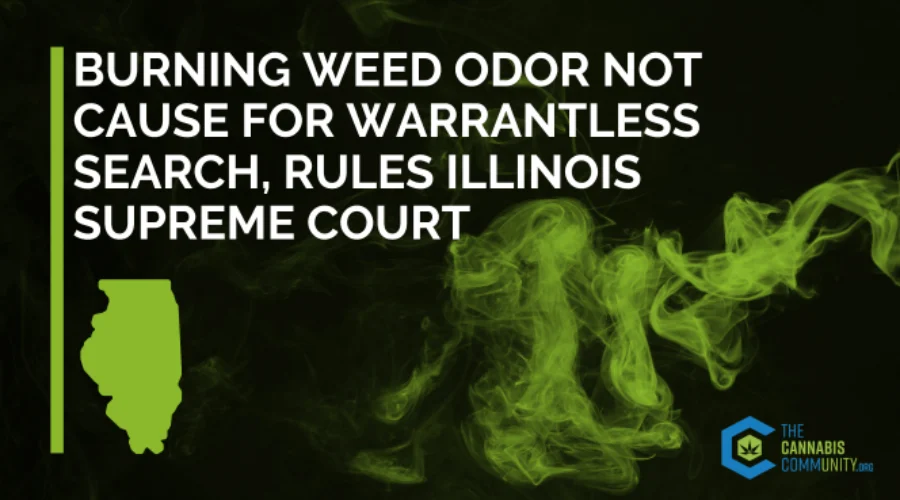Burning Weed Odor Not Cause for Warrantless Search, Rules Illinois Supreme Court
Table of Contents
A Landmark Case for IL Medical Cannabis Patient Protections
On September 9th, the Illinois Supreme Court issued a major victory for cannabis consumers and patients, declaring that the aroma of burnt cannabis is insufficient probable cause for a warrantless search.

Illinois has long been at the forefront of the fight for plant medicine. Medical patients have had access to cannabis for 11 years, and four years ago, it became available to all adults over the age of 21. But as cannabis consumers know, just because the plant is legal doesn’t mean the stigma around it is erased.
The aroma of burnt cannabis in vehicles put patients at risk of invasive questions and even car searches from law enforcement. But no longer. This landmark court case established the precedent that the odor of burnt marijuana alone is not sufficient probable cause to search a vehicle.
Illinois v Redmond: What You Need to Know

The People of the State of Illinois v Redmond was brought to the Supreme Court of Illinois in January 2024, but the ruling was issued just weeks ago. At the heart of the matter was the legality of a warrantless vehicle search based on the smell of burnt cannabis.
The Court said, “In this case we must determine, after the recent changes to Illinois’s cannabis laws, whether a police officer’s detection of the odor of burnt cannabis, considered alone or in conjunction with other facts, provides probable cause to conduct a warrantless search of a vehicle.”
The plaintiff, Redmond, was pulled over by a police officer for doing 73 mph in a 70 mph section of highway and an improper display of the vehicle’s registration. After approaching the vehicle, the officer smelled weed smoke. He used that odor as justification to search the car without a warrant, looking for evidence that Redmond had illegally consumed cannabis within the car while driving or had weed in improper storage. He placed Redmond in his squad car and found one, tiny gram of weed in the center console. The officer did not find any burning weed in the car or on Redmond, nor did Redmond himself smell like weed. The officer admitted that there were no signs of impairment.
Despite this, Redmond was charged with unlawful possession of cannabis (because it was improperly stored) and unlawful possession of cannabis by a driver. Redmond filed to suppress the cannabis as evidence and the court approved this, ruling that evidence found during the search was unlawful and could be suppressed, as the officer lacked any real evidence that the plaintiff was impaired, beyond the smell of weed.
The Courts Agree: Weed Smell is Not Criminal
The state appealed this decision and the Appellate Court affirmed the lower court’s decision, stating the “absence of evidence supporting the search.” The State appealed again and the case appeared before the Supreme Court in January 2024.

Redmond argued that “after the legislature legalized the use and possession of cannabis, the odor of burnt cannabis emanating from a vehicle alone “lacks a clear and direct enough connection to illegal activity to make it ‘probable’ that a crime has recently been committed or is being committed.”
The Supreme Court of Illinois agreed. At the heart of the ruling, the Court agreed that legalizing cannabis changes the threshold for probable cause in vehicle searches. Smelling an illegal drug may be probable cause, but once cannabis is legalized, the odor is no longer a justifiable reason for a warrantless search. (And the state of Illinois actually agreed too, during the Oral arguments in front of the Court.)
Protecting Medical Marijuana Patient Rights in Illinois
This victory is a major step forward for protecting patient rights in Illinois. Other states, like New York, have already ruled that the odor of cannabis is not suspicious or probable cause. Subjecting a medical marijuana patient to a warrantless search is invasive, cruel, and unnecessary. And now, law enforcement must oblige.
Prior to this case, there was no specific language in the legislature that protected medical marijuana patients against warrantless probable cause search and seizures. Patients can take assurance in knowing that transporting your medicine is not a crime, and that the odor of cannabis alone is no longer legal justification for a police officer to search your car.
However, there are limits to this victory. The Court was specific in noting that this decision is about the aroma of burnt or burning cannabis – not the aroma of the raw plant itself. That decision will come later and will focus on the legality of requiring a “sealed, child-proof, odor-proof container.”

This ruling is just the start of updating Illinois laws based on legal cannabis. Medical patients deserve easier access to their medicine, the ability to purchase cannabis at recreational dispensaries, and updated legislation that further protects patients who are parents.
Have more questions about medical marijuana in Illinois? Join The Cannabis Community and get access to advice and support from thousands of medical marijuana patients and medical marijuana experts across the country.




